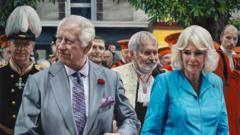Can Mamdani Overcome Upcoming Challenges After His Remarkable Victory?

Published: 2025-11-05 04:00:08 | Category: technology
Zohran Mamdani's election as New York City's mayor marks a significant milestone in the city's political landscape, as he becomes the youngest, first Muslim, and first African-born mayor in its history. His victory over established political figures demonstrates a shift toward progressive leadership within the Democratic Party, reflecting a growing desire for change among voters. Mamdani's platform advocates for social and economic reforms, but he faces challenges in governing and uniting a diverse electorate while navigating the political establishment.
Last updated: 05 November 2023 (BST)
What’s happening now
Zohran Mamdani's recent election as mayor has sent ripples through both local and national political spheres. As he prepares to take office in January, the implications of his leadership style, policies, and ability to navigate New York's complex political landscape are under close scrutiny. His progressive agenda prioritises economic equity and social reforms, resonating with a younger, more diverse voter base. However, he will have to contend with existing political dynamics, including potential pushback from more centrist Democratic leaders and Republican opposition.
Key takeaways
- Mamdani is the youngest mayor of New York City since 1892 and the first Muslim mayor.
- His victory over established politicians like Andrew Cuomo signals a shift in Democratic Party dynamics.
- He has committed to progressive policies, focusing on working-class issues and social equality.
Timeline: how we got here
The journey to Mamdani's election has been marked by several key events:
- 2022: Mamdani announces his candidacy for mayor, despite facing significant challenges, including a lack of name recognition and funding.
- September 2023: Primary elections held, where Mamdani gains traction among progressive voters.
- November 2023: Mamdani wins the mayoral election against former Governor Andrew Cuomo and Republican Curtis Silwa.
What’s new vs what’s known
New today/this week
Mamdani's election has generated significant media attention, highlighting his progressive agenda and potential challenges ahead. His commitment to ambitious reforms like free childcare and expanded public transportation reflects a broader shift within the Democratic Party towards more leftist policies. Additionally, he has made headlines for his outspoken criticisms of established political norms, particularly regarding corporate influence in local governance.
What was already established
Prior to Mamdani's election, New York’s political landscape was dominated by figures like Bill de Blasio, whose tenure was marked by mixed reviews and limited successes in implementing progressive policies. The electorate has expressed growing discontent with traditional political figures, paving the way for a candidate like Mamdani who resonates with younger and more diverse voters.
Impact for the UK
Consumers and households
While Mamdani's election is a US-centric event, it reflects broader trends that resonate globally. The focus on social equality and economic reforms is mirrored in UK politics, where issues of affordability and living costs dominate public discourse. As UK voters observe Mamdani's policies, they may find parallels in their own local elections, particularly regarding the need for leaders who genuinely represent diverse communities.
Businesses and jobs
Mamdani's anti-establishment stance may initially unsettle businesses, particularly in New York's financial sector. His approach to governance will be scrutinised for its impact on job creation, economic stability, and the relationship between the city and its corporate entities. Businesses in the UK can also take note of how progressive policies are balanced with economic realities, as similar debates unfold in their local contexts.
Policy and regulation
His election raises questions about the future of local governance and its relationship with federal and state regulations. The UK may draw insights from how Mamdani navigates these challenges, particularly in a political climate that often pits local needs against broader party ideologies.
Numbers that matter
- 46%: Percentage of Americans who reported following the New York mayoral election "not closely at all," indicating a potential opportunity for Mamdani to define his public image.
- 12 years: The time since the last major shift in New York City’s mayoral leadership, highlighting the significance of this election.
- 1: The number of Muslim mayors in New York City history, showcasing Mamdani's historic election.
- 8 years: The duration of Bill de Blasio's term, which ended with mixed reviews, setting a precedent for Mamdani's governance.
- 3: The number of key issues identified by voters in the recent election, primarily focusing on economic challenges, affordability, and quality of life.
Definitions and jargon buster
- Democratic Socialist: A political ideology that advocates for political democracy alongside social ownership of the means of production, often advocating for reforms to promote social justice.
- Progressive Policies: Initiatives aimed at social reform, often focusing on issues like economic inequality, healthcare access, and environmental sustainability.
- Corporate Influence: The impact that large corporations have on political decision-making, often perceived as a challenge to democratic principles and public interests.
How to think about the next steps
Near term (0–4 weeks)
Mamdani will focus on assembling his administration, defining his key priorities, and establishing a clear communication strategy to engage with constituents and stakeholders. He will need to address immediate challenges such as budgetary constraints and relationships with key political figures.
Medium term (1–6 months)
As he settles into office, Mamdani will begin to outline specific policies and initiatives while seeking to build coalitions both within the Democratic Party and with external stakeholders. His ability to balance progressive goals with practical governance will be crucial during this period.
Signals to watch
- Public opinion polls reflecting Mamdani's approval ratings and perceptions of his leadership.
- Legislative developments related to his proposed policies, particularly in education and transportation.
- Interactions with prominent political leaders, such as Governor Kathy Hochul and Senator Chuck Schumer, which may indicate broader party dynamics.
Practical guidance
Do
- Engage with community leaders to build support for progressive initiatives.
- Communicate transparently with constituents about challenges and successes.
- Prioritise economic policies that directly benefit working-class families.
Don’t
- Ignore criticism from political opponents; instead, address issues head-on.
- Overpromise on ambitious reforms without a clear implementation strategy.
- Neglect the importance of bipartisan support for key initiatives.
Checklist
- Define short and long-term policy goals with measurable outcomes.
- Establish a communication plan to engage with minority and working-class communities.
- Identify key allies within the Democratic Party to build legislative support.
- Monitor public sentiments on economic issues to adjust strategies as needed.
- Prepare for potential challenges from political opponents by developing counter-narratives.
Risks, caveats, and uncertainties
Mamdani's ascent to mayoral office brings inherent uncertainties. Questions about his ability to govern effectively amid political opposition, potential economic downturns, and public criticism loom large. His progressive policies may face significant hurdles, particularly if funding is not secured or if public opinion shifts. The evolving political landscape will require Mamdani to remain adaptable and responsive to both supporters and detractors.
Bottom line
Zohran Mamdani's election represents a pivotal moment for New York City and for the Democratic Party as a whole. While he embodies the aspirations of a progressive base seeking systemic change, his success will depend on his ability to navigate the complexities of governance and unite a diverse electorate. As he prepares for office, the eyes of the nation will be on him, making his inaugural term a critical test of progressive ideals in action.
FAQs
Who is Zohran Mamdani?
Zohran Mamdani is the newly elected mayor of New York City, notable for being the youngest, first Muslim, and first African-born mayor in the city's history.
What are Mamdani's main policy goals?
Mamdani's policy goals include free childcare, expanded public transportation, and addressing economic inequalities, focusing on support for working-class families.
How does Mamdani's election impact the Democratic Party?
His election signifies a shift towards progressive leadership within the Democratic Party, representing the desires of a younger and more diverse voter base seeking transformative change.



